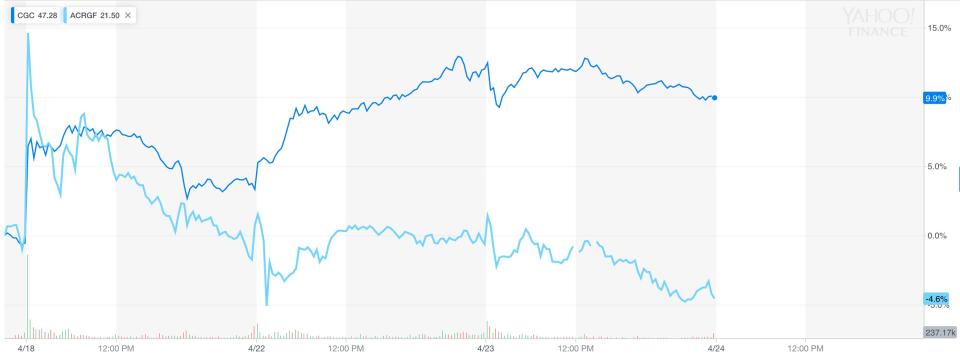What investors don't understand about Canopy Growth’s Acreage deal: CEO
Canopy Growth CEO Bruce Linton has been on a tour promoting the upside to the groundbreaking $3.4 billion agreement he forged giving Canopy the right to buy one of the largest U.S. cannabis operators Acreage Holdings.
The deal is unorthodox for a number of reasons, not the least of which being that it is conditional on the sale of cannabis in the U.S. becoming permissible at a federal level. Provided that happens within the roughly seven years the agreement is active, Canada-based Canopy (CGC) would acquire Acreage (ACRGF) in exchange for an agreed upon ratio of Canopy shares that equates to about a 42% premium above where Acreage shares were trading before the deal was announced.
Acreage shares, however, have not traded in line with that upside, indicating that some investors might be discounting the odds that the U.S. allows for the sale of cannabis at a federal level. Despite a near 10% jump for Canopy shares following the deal’s announcement, Acreage shares have fallen 5%. According to Linton, part of the reason could be that investors are having trouble understanding the first-of-its-kind deal in a notoriously grey legal area.

“I feel like I’ve just released a new record or a book or something, I’m running around the [media] circuit to try and explain it,” Linton said on Yahoo Finance’s YFi PM. “I think a lot of people don’t understand that there is some risk between now and a vote, and then there is some risk that over the next seven years governments won’t actually regulate it. And at a federal level, it’s so easy to do in a way that would keep everyone happy.”
Acreage and Canopy Growth shareholders will need to approve the terms of the deal at special shareholders meetings scheduled for June. The deal would also be subject to regulatory and exchange approval. Linton noted the deal was structured to ensure his company continues to comply with New York Stock Exchange rules that prevent companies violating federal law from trading. Presenting the company as a publicly traded entity on such a major exchange has helped drive international expansion, according to Linton.
“If you want to show up in foreign jurisdictions and talk about cannabis it’s better to open up with ‘New York Stock Exchange’ because that elevates credibility and the conversation can move to policy, so we didn’t want to wreck that,” he said.

Cannabis needs to become federally permissible
The Canopy-Acreage agreement hinges on the sale of cannabis becoming “federally permissible” and that is an important distinction from “federally legal,” Linton stressed. Recently re-introduced legislation on the matter in the so-called STATES Act would shift the question solely to the states, and let cannabis businesses bank at a federal level. According to Linton, a passage of that bill would satisfy the deal’s terms and comply with exchange rules. Acreage Holdings CEO Kevin Murphy told Yahoo Finance earlier this year that he expects the bipartisan bill to pass by the end of 2019.
Cannabis analysts tend to be less optimistic. Piper Jaffray’s Michael Lavery, for example, expects a timeframe of two to five years for cannabis sales to reach federal permissibility. Nonetheless, with former Speaker of the House John Boehner on Acreage’s board, Linton has now given a multibillion dollar incentive for him to continue lobbying for the country to accept cannabis at a federal level.
Even if it does take longer than expected to trigger the buyout, Linton stressed both companies will enjoy the upside of shared intelligence in the meantime at no cost. “Does it happen tomorrow? It’s OK if it doesn’t,” he said.
But if investors — including retail investors — come to believe the deal is as likely to be completed as both companies clearly do, perhaps Acreage does trade closer to the 40% premium as laid out in the agreement, Linton predicts.
“I think what’s going to happen is the retail people are going to go, ‘So what you’re saying is if that vote passes and this thing starts to trade together I can make 30% to 40%?’” Linton said. “So I think it’s going to trade together, but I think people need to understand the opportunity.”
Similarly, Linton pointed out how perplexed he was when Constellation Brands (STZ), which owns a minority stake in Canopy , wasn’t rallying back in February. Since then, Constellation Brands has traded roughly 20% higher.
Zack Guzman is the host of YFi PM as well as a senior writer and on-air reporter covering entrepreneurship, startups, and breaking news at Yahoo Finance. Follow him on Twitter @zGuz.
Read more:
Blue Moon's creator launched a cannabis beer that sold out in 4 hours
Constellation Brands shareholders are getting Canopy Growth almost for 'free': Canopy CEO
Exclusive: Canopy Growth to invest up to $500 million in hemp production in U.S. states